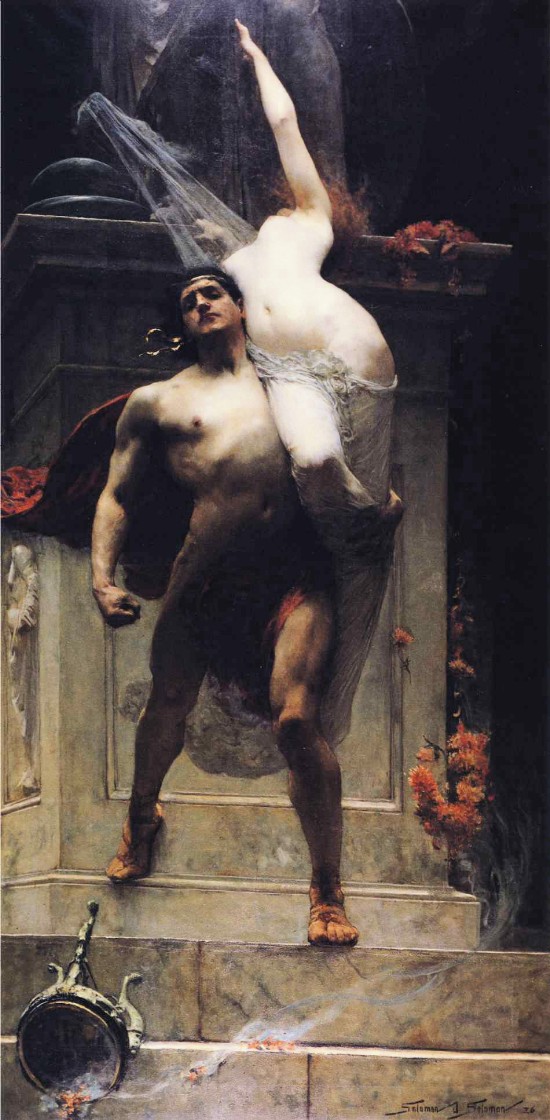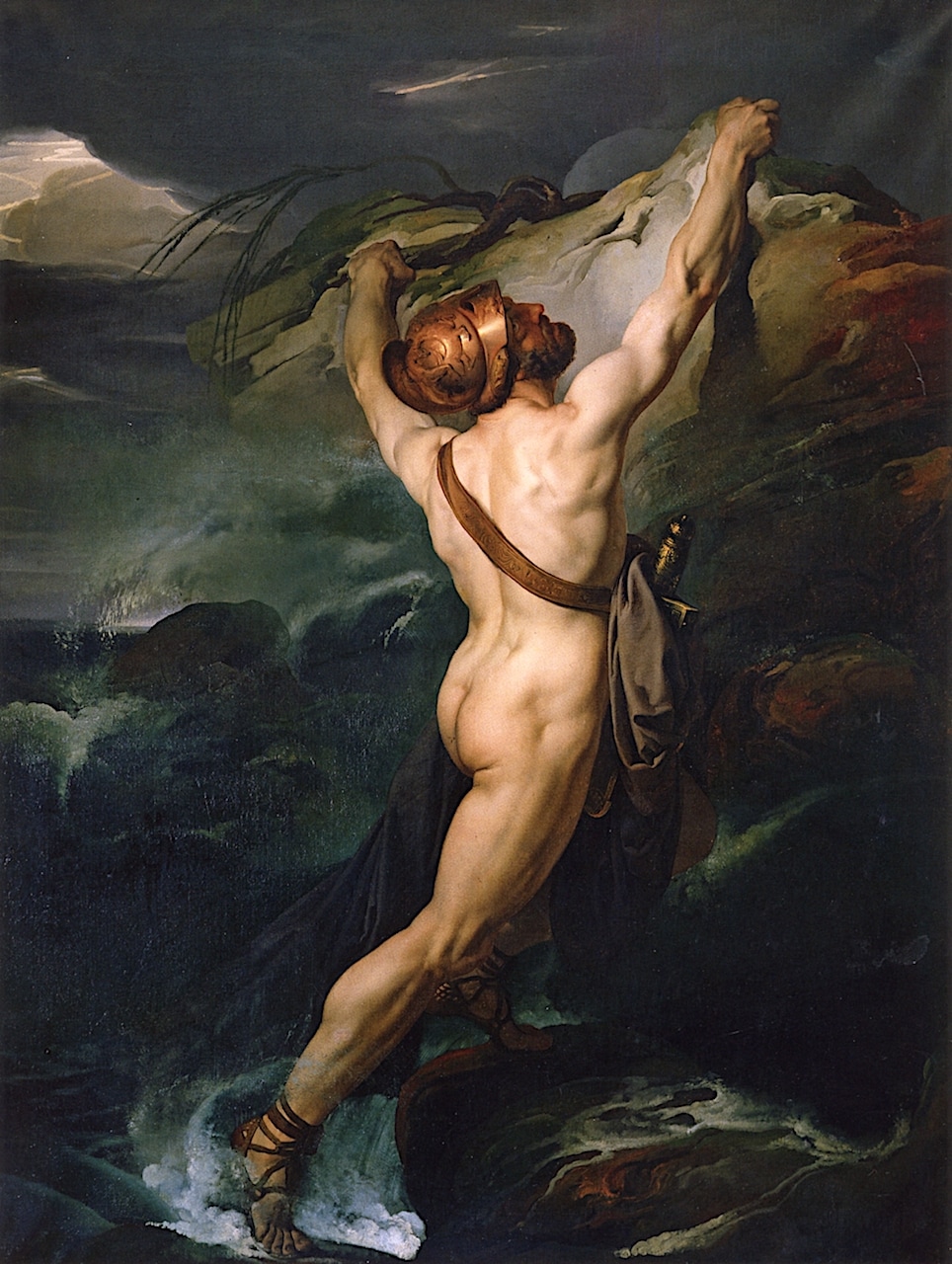AJAX THE LESSER IN GREEK MYTHOLOGY
Ajax the Lesser, or Locrian Ajax, is one of the prominent Achaean heroes during the Trojan War; a fighter of some note, Ajax the Lesser is today best known for his sacrilegious acts during the Sacking of Troy.
Ajax Son of Oileus
Ajax was the son of Oileus, King of Locris, who in the preceding generation had been one of the Argonauts.
The mother of Ajax was called either Rhene, a concubine of Oileus, or Eriopis. Rhene though was the mother of Medon by Oileus, and Medon is normally referred to as the half-brother of Ajax the Lesser.
The mother of Ajax was called either Rhene, a concubine of Oileus, or Eriopis. Rhene though was the mother of Medon by Oileus, and Medon is normally referred to as the half-brother of Ajax the Lesser.
The Many Names of AjaxAjax is variously known as Locrian Ajax, as he was from Locris, or Ajax the Lesser or Ajax the Little, for his small stature; the need for these distinguishing names was due to the fact that, during the Trojan War, there was another famous Ajax, Ajax the Greater, son of Telamon.
Ajax Suitor of HelenAjax the Lesser is commonly called one of the Suitors of Helen, meaning that he had vied for the hand of Helen, before Menelaus was chosen as Helen’s husband. This also meant that Ajax the Lesser was also one of those who had taken the Oath of Tyndareus, promising to protect Helen’s chosen husband.
This oath would see Locrian Ajax bring 40 ships of Locrians to Aulis, for the gathering of ships, thus, Ajax the Little was in charge of the Locrian contingent at Troy, and was joined at Aulis by his half-brother Medon. Medon would take over the command of the force from Meliboea, after the abandonment of Philoctetes, although Medon himself would die during the Trojan War, killed by Aeneas. |
|
Ajax the Lesser During the Trojan War
Ajax the Lesser might have been short in stature, but he was fleet of foot, and deadly with the spear. Locrian Ajax acquitted himself well during the Trojan War, and may have killed as many as 14 named Trojan defenders.
Homer names Ajax as the killer of Satnius, son of Enops, by a spear in his side, and Cleobulus, with a sword in the neck. Additionally, Ajax probably also killed the Amazon Derinoe, Gavius and Amphimedon.
Ajax would often be found in the company of Ajax the Greater, and as a fighting pair, they were called the Aiantes. Thus, Ajax the Lesser was prominent in the defence of the Achaean ships, and also in the defence of the body of Patroclus. It was also said that Ajax the Lesser volunteered to face Hector in single combat.
Unlike Ajax the Great, Ajax the Lesser would survive until the end of the war, and was named as one of the Achaeans who hid in the belly of the Wooden Horse and took part in the Sacking of Troy.
Away from the fighting Ajax was considered to be a quarrelsome individual and an antagonist of Odysseus; with the antipathy between the pair evident when during the funeral games, Odysseus beat Ajax the Lesser in a foot race, although Odysseus only won because he was favoured by the goddess Athena.
Homer names Ajax as the killer of Satnius, son of Enops, by a spear in his side, and Cleobulus, with a sword in the neck. Additionally, Ajax probably also killed the Amazon Derinoe, Gavius and Amphimedon.
Ajax would often be found in the company of Ajax the Greater, and as a fighting pair, they were called the Aiantes. Thus, Ajax the Lesser was prominent in the defence of the Achaean ships, and also in the defence of the body of Patroclus. It was also said that Ajax the Lesser volunteered to face Hector in single combat.
Unlike Ajax the Great, Ajax the Lesser would survive until the end of the war, and was named as one of the Achaeans who hid in the belly of the Wooden Horse and took part in the Sacking of Troy.
Away from the fighting Ajax was considered to be a quarrelsome individual and an antagonist of Odysseus; with the antipathy between the pair evident when during the funeral games, Odysseus beat Ajax the Lesser in a foot race, although Odysseus only won because he was favoured by the goddess Athena.
Ajax and the Sacking of Troy
|
The good name that Ajax the Lesser had established during the fighting of Troy was destroyed by his actions during the Sacking of Troy, and now is remembered for his sacrilegious act rather than his heroic deeds.
During the Sacking of Troy, Locrian Ajax entered the temple of Athena and there found Cassandra, daughter of King Priam. Cassandra was hanging tight to a statue of Athena, but ignoring the sanctuary that this action should have offered Cassandra, Ajax forcibly removed her from the temple. Some even tell of Ajax the Lesser raping Cassandra in the temple. These actions greatly angered the goddess Athena, but the other Achaean leaders were ignorant of the crimes that Ajax the Lesser may have committed. Eventually, the Achaean seer Calchas revealed that Athena was angry with them, and Odysseus told the other Achaeans that they would have to stone Locrian Ajax to death. Ajax the Lesser though escaped this death sentence, either by swearing that he had done nothing wrong, or seeking sanctuary himself in one of the temples of the gods. |
Agamemnon was faced with a quandary for killing Ajax now might bring down the anger of the gods upon him, for the same reason that they were angry with Ajax the Lesser, and so Ajax was left unpunished, and sacrifices were simply offered to the gods.
The Death of Ajax the Lesser
|
Athena was not placated by the sacrifices and as the Achaean fleet set sail, called for storms and winds to disrupt the return journey of the Achaean heroes.
It was during the subsequent storms that Ajax the Lesser was said to have died, although two different versions of Ajax’s demise are given. In one tale, the ship on which Ajax the Lesser sailed was wrecked upon the Whirling Rocks, but the Achaean hero was saved by the intervention of Poseidon, and Ajax found himself hanging to the rocks. Then Ajax, in a great error of judgement, pronounced that he lived despite the best attempts of the gods. |
Poseidon though took this as an insult, and struck the rock that Ajax was clinging on with his trident; the rock split into two, and Ajax lost his handhold, and was subsequently drowned.
Alternatively, Athena wrecked the ship of Ajax off of the coast of Euboea, and then killed the Achaean hero with a lightning bolt.
In either case, the body of Ajax was said to have washed up on the island of Mykonos, with the body subsequently buried by the Naiad Thetis.
After the death of Ajax the Lesser it was commonly said that the soul of the hero was to be found on the island of Leuce, the White Isle, one of the regions associated with “paradise” in the Greek afterlife. On the White Isle, Ajax the Lesser would be in the company of Ajax the Greater, Patroclus and possibly Achilles.
Alternatively, Athena wrecked the ship of Ajax off of the coast of Euboea, and then killed the Achaean hero with a lightning bolt.
In either case, the body of Ajax was said to have washed up on the island of Mykonos, with the body subsequently buried by the Naiad Thetis.
After the death of Ajax the Lesser it was commonly said that the soul of the hero was to be found on the island of Leuce, the White Isle, one of the regions associated with “paradise” in the Greek afterlife. On the White Isle, Ajax the Lesser would be in the company of Ajax the Greater, Patroclus and possibly Achilles.
|
|

